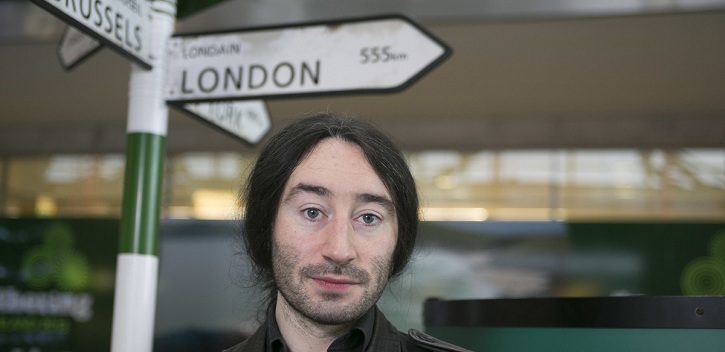2014 Press Releases
UCC study investigates 'commuter migrants'

A UCC study has investigated the experiences of Irish-based ‘commuter migrants’ to other European countries with some unexpected results.
This growing group of international commuters have been given various euphemisms. Economist David McWilliams called them “mortgage refugees” – because they commute overseas to service mortgages back in Ireland. RTÉ’S Philip Gallagher called them “semigrants” – as they are half-way between “staying” and “emigrating”. A staff member at Dublin airport called them the “Monday-morning mob” – because each Monday they crowd onto aircraft across Irish airports bound for cities like London, Paris, Brussels, Amsterdam, Geneva, Munich, and Frankfurt.
The research by Dr David Ralph of UCC’s Institute for Social Sciences in the 21st century was based on 30 in-depth qualitative interviews with commuter couples with interviews lasting from one to three hours which were usually carried out in participants’ homes.
According to Dr Ralph one of the principal findings of the research – somewhat unexpectedly – is that, by and large, the commuters are relatively well-paid professionals, working in areas such as finance, banking, accountancy, academia, media, engineering, the law and medicine. The vast majority of commuters are male, with their female partners remaining in the family residence in Ireland. Few, if any commuters work in the social and construction sectors; many of these positions simply do not pay enough to cover the costs of a commuter arrangement – two domestic residences, weekly or bi-weekly air travel, and so on.
Also unexpectedly, not all the people commute overseas as a direct consequence of the economic crisis. Rather, as one participant explained, there are identifiably different “species”, or types, of commuters. First, a small number commute as a matter of “lifestyle” – which is to say, they enjoy to-ing and fro-ing between Ireland and another country; it gives them a better quality of life. Some are polyglots, enjoy being in a foreign culture, speaking another language, meeting new people, learning new job skills. They may find the working environment here too parochial. This group he terms “lifestyle commuters”.
Another group, again small in number, commute not because they lost their job with the economic downturn but because they are highly career-minded. They hit a glass ceiling in their workplaces here. If they were ever to move upwards along their chosen career path, then they needed to cast the jobs’ net wider, get off this island. Many have since won promotions overseas. Their main reason for commuting and not emigrating is that they are in long-term relationships with partners who could not, or would not, leave Ireland. This group he terms “career commuters”.
The vast majority of those he interviewed, however, do not commute voluntarily. They feel forced into this situation, compelled to seek work overseas so they can continue paying burdensome mortgages here. Commuting means they can be close to their families – many are married, many have school-age children – and as such, it is a better option than emigration.
Some here said that they would emigrate as a family unit if they could be rid of the responsibilities of their mortgages. Others would prefer to remain living full-time in Ireland, if they had the choice. What this group have in common, mainly, is negative equity – and calling them “mortgage refugees”, then, is not just colourful language.
A second feature shared by this group: all were fearful of falling out of the Irish middle class, a status they had enjoyed during the pre-crisis days. Remaining in Ireland on reduced means may result in the family having to move to a less prestigious residential area and cut back on annual holidays, private health insurance and children’s extra-mural activities. By commuting to well-paid jobs overseas, this undesirable scenario is largely averted; they can restore as close a semblance as possible of life pre-crisis.
Sociologists call the phenomenon of moving up from a lower to a higher social position “social mobility”. Its opposite – falling from a higher to a lower social position – they term “skidding”. Many of the commuters with whom he spoke are fearful of skidding; that’s why they became commuters in the first, and arguably the final, instance. This group he terms “livelihood commuters.”
Dr Ralph’s research was funded by the European Commission and follows previous work undertaken by him on the experiences of return migration to “Celtic Tiger” Ireland.
“Overall, commuters are a resourceful, resilient group,” he observes. “They put their skills, education and work experience to creative use in the face of difficult circumstances in Ireland. Nevertheless, the chronic travelling and separation from loved-ones takes its toll. Fatigue from too many red-eye flights, miscommunication with partners and children back home during weekday separations, loneliness overseas – these are common complaints among commuters.”
Some had problems controlling their alcohol consumption while away during weekdays; others worried about sexual infidelity during periods of absence from partners.
“The future was a further source of anxiety for many,” says Dr Ralph. “Most hope that the Irish economy will recover its former buoyancy, and they will be able to find suitable job positions back home as soon as possible. Yet hope is one thing, reality another. Most have no faith in this actually happening anytime soon; they are preparing to put up with commuting overseas for the long-haul.”
